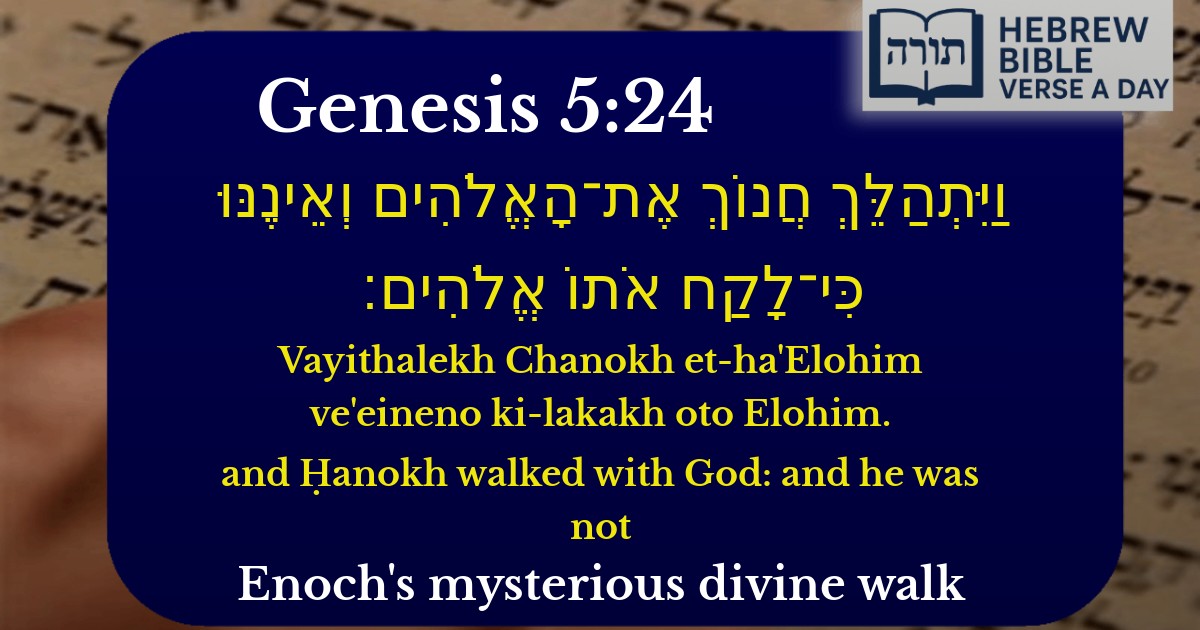Frequently Asked Questions
Q: What does it mean that Chanokh (Enoch) 'walked with God'?
A: According to Rashi and other Jewish commentators, 'walking with God' means that Chanokh lived a life of complete righteousness and devotion. The Midrash explains that he served Hashem with pure intent and separated himself from worldly distractions. Unlike others in his generation, he aligned his actions entirely with Divine will.
Q: Why does the verse say 'and he was not' about Chanokh?
A: The Talmud (Yevamot 16b) and Rashi explain that Chanokh did not experience a natural death like others in the genealogy. Instead, Hashem 'took him' prematurely—some commentaries say this means he was taken from this world alive due to his extraordinary righteousness, while others suggest it may imply an early death to prevent him from sinning later.
Q: What lesson can we learn from Chanokh's life?
A: The Rambam teaches that Chanokh serves as an example of teshuvah (repentance/returning to God). Midrashim describe how he transformed from an ordinary person to someone who achieved such closeness to Hashem that he merited a unique departure from this world. This teaches that spiritual growth is always possible, and even a short life can have eternal significance if lived with purpose.
Q: How is Chanokh different from Eliyahu HaNavi (Elijah the Prophet), who also didn't die?
A: While both were taken by Hashem without experiencing death, the Talmud (Chagigah 15a) distinguishes them: Eliyahu ascended to heaven in a whirlwind (Melachim II 2:11) and remains active in Jewish tradition (e.g., visiting every brit milah). Chanokh's departure is described more mysteriously—some Midrashim suggest he became the angel Metatron, while others emphasize his role as a model of repentance.
Q: Why is Chanokh's story important in the Torah's genealogy?
A: Rabbi Samson Raphael Hirsch explains that Chanokh's inclusion shows that even in generations before Avraham, individuals could achieve righteousness. His brief mention (compared to others who lived much longer) teaches that quality of life matters more than quantity of years. The Sforno adds that his story contrasts with the corruption leading to the Flood, showing that moral choice always exists.


Understanding the Verse
The verse states: "וַיִּתְהַלֵּךְ חֲנוֹךְ אֶת־הָאֱלֹהִים וְאֵינֶנּוּ כִּי־לָקַח אֹתוֹ אֱלֹהִים" ("And Ḥanokh walked with God, and he was not, for God took him"). This describes the unique fate of Ḥanokh (Enoch), who did not experience a natural death but was instead taken by God.
Rashi's Commentary
Rashi explains that Ḥanokh was a righteous man who "walked with God" in righteousness and integrity. The phrase "וְאֵינֶנּוּ" ("and he was not") indicates that he was taken from the world before his time, as he was removed from earthly existence without dying. Rashi notes that this was a reward for his righteousness, as God spared him from the fate of death that befalls all humans due to the sin of Adam.
Rambam's Perspective
Rambam (Maimonides) discusses Ḥanokh in Moreh Nevuchim (Guide for the Perplexed 1:42), interpreting his "walking with God" as a metaphor for achieving intellectual and spiritual perfection. Rambam suggests that Ḥanokh attained such a high level of divine knowledge that his physical existence was no longer necessary, and he was therefore taken from this world in a miraculous manner.
Midrashic Interpretations
Ibn Ezra's Explanation
Ibn Ezra emphasizes the literal meaning of the verse, stating that Ḥanokh was taken by God in an extraordinary way, unlike other humans. He cautions against excessive allegorization, maintaining that the Torah records this event as a factual occurrence.
Kabbalistic Insights
In Kabbalistic thought (e.g., Zohar), Ḥanokh's ascent is seen as a mystical elevation of the soul, where he transcended the physical realm to unite with the divine. His "walking with God" symbolizes a soul’s complete attachment (devekut) to the Divine Presence.
Halachic Implications
While Ḥanokh’s case is unique, some later halachic discussions (e.g., Chatam Sofer) derive from this verse that exceptional righteousness can lead to divine intervention beyond natural law, though this is not normative for human experience.